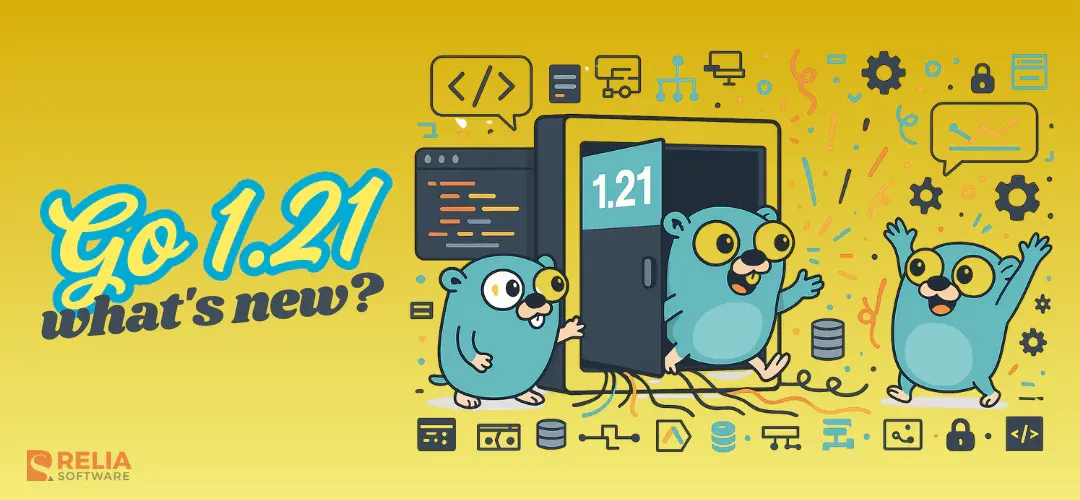Go 1.21 has landed six months after 1.20. Let's discover sigificant changes in its features via this article!
>> Read more:
- Top 10 Best Golang Web Frameworks
- Go Tutorial: Golang Basics of Knowledge for Beginners
- Top 10 Best IDEs for Golang Web Development
Introduction To Go 1.21
Go 1.21, the latest release in the Go programming language series, brings a myriad of improvements in toolchain implementation, runtime, and libraries. Released six months after Go 1.20, this version maintains and enhances the Go 1 promise of compatibility. In this blog post, we'll delve into the key features and changes introduced in Go 1.21.
Changes to Release Numbering
A small but notable change has been introduced in the numbering of releases. In Go 1.21, the first release is now labeled as Go 1.N.0. This release includes the Go 1.21 language and its initial implementation, known as the Go 1.21.0 release.
This blog will refer to it as "Go 1.21," while tools like go version will display "go1.21.0" until an upgrade to Go 1.21.1. Refer to the "Go Toolchains" documentation for a detailed explanation of the new version numbering.
Changes to the Language
New Built-ins
Go 1.21 introduces three new built-in functions:
- min and max: Compute the smallest or largest value from a fixed number of given arguments.
// Max
num := max(1, 2, 3)
fmt.Println("Max =", num)
// Min
minNum := min(1, 2, 3)
fmt.Println("Min =", minNum)myList := []int{1, 2, 3}
// Max in Slice
max := slices.Max(myList)
fmt.Println("Max in Slice =", max)
// Min in Slice
min := slices.Min(myList)
fmt.Println("Min in Slice =", min)- clear: Delete all elements from a map or zero all elements of a slice.
m := map[string]int{"x": 1, "y": 2, "z": 3}
clear(m)
fmt.Println(m) // Outputs: map[]- New log/slog package: provides structured logging, in which log records include a message, a severity level, and various other attributes expressed as key-value pairs.
slog.Info("hello", "count", 3)
// output is
// 2022/11/08 15:28:26 INFO hello count=3
logger := slog.New(slog.NewTextHandler(os.Stderr, nil))
logger.Info("hello", "count", 3)
// output is
// time=2022-11-08T15:28:26.000-05:00 level=INFO msg=hello count=3
logger := slog.New(slog.NewJSONHandler(os.Stdout, nil))
logger.Info("hello", "count", 3)
// output is
// {"time":"2022-11-08T15:28:26.000000000-05:00","level":"INFO","msg":"hello","count":3}
slog.Group("request", "method", r.Method, "url", r.URL)
request.method=GET
request.url=http://example.com
// output is
// "request":{"method":"GET","url":"http://example.com"}>> Explore more: 10 Best Logging Libraries for Golang Developers
Package Initialization Order
The package initialization order is now precisely specified. The new algorithm involves sorting all packages by import path and initializing them in a defined order. This change may impact programs relying on specific initialization orders, providing a more unambiguous definition.
Type Inference Improvements
Several improvements have been made to type inference, enhancing its power and precision:
- A generic function can now be called with arguments that are themselves generic functions.
- Type inference considers methods when a value is assigned to an interface.
- Multiple enhancements in type inference accuracy.
Preview of Language Change
Go 1.21 includes a preview of a language change for loop variables, aiming to make them per-iteration rather than per-loop. This change helps avoid accidental sharing bugs. Check the LoopvarExperiment wiki page for details on trying out this language change.
Panicking and Recover
In Go 1.21, if a goroutine is panicking and recover was called directly by a deferred function, the return value of recover is guaranteed not to be nil. A runtime panic of type *runtime.PanicNilError will occur if panic is called with a nil interface value or an untyped nil. To support older Go versions, nil panics can be re-enabled by setting GODEBUG=panicnil=1.
>> You may consider:
- Hands-On Implementation for Dependency Injection in Go
- Best Practices For Dependency Inversion in Golang
- Detailed Code Examples of Dependency Inversion in Golang
Tools
Go 1.21 enhances support for both backward and forward compatibility in the Go toolchain.
Backward Compatibility
To handle changes that are non-breaking but may impact existing programs, Go 1.21 formalizes the use of the GODEBUG environment variable. The toolchain now chooses between old and new behaviors based on the go line in the workspace's go.work file or the main module's go.mod file.
Forward Compatibility
Go 1.21 reads the go line in a go.work or go.mod file as a strict minimum requirement. If a workspace or module specifies go 1.21.0, it cannot be used with Go 1.20 or Go 1.21rc1. The go command can now invoke other Go toolchain versions found in the PATH or downloaded on demand based on the version specified in go.mod or go.work.
Go Command Changes
- The
pgobuild flag defaults topgo=auto. - The
C dirflag must be the first flag on the command line. - New options for
go test:fullpath,c, ando.
Cgo
In files that import "C", the Go toolchain now correctly reports errors for attempts to declare Go methods on C types.
Runtime
Several enhancements and optimizations have been introduced in the runtime:
- Improved stack trace printing for better debugging.
- Transparent huge page management on Linux platforms for better memory utilization.
- Garbage collection tuning for up to 40% reduction in application tail latency.
- Reduced overhead of subsequent C to Go calls on Unix platforms.
Compiler
Profile-guided optimization (PGO) is now ready for general use, providing performance improvements of up to 7% for a representative set of Go programs. Assembler improvements and better build speed (up to 6%) have also been implemented.
Linker
On Windows/amd64, the linker emits SEH unwinding data by default, improving integration with Windows debuggers. The linker is now capable of deleting dead global map variables and offers better performance.
Core Library
New Packages
- log/slog: Provides structured logging with levels.
- testing/slogtest: A package to validate
slog.Handlerimplementations. - slices: Offers common operations on slices using generic functions.
- maps: Provides common operations on maps using generic functions.
- cmp: Defines the type constraint
Orderedand two new generic functionsLessandComparefor ordered types.
Minor Changes
Various minor changes and updates have been made to the library, adhering to the Go 1 promise of compatibility. Performance improvements are included, though not explicitly detailed.
Archive and Compression Packages
Several improvements and additions have been made to packages such as archive/tar, archive/zip, and bytes.
Crypto Packages
- crypto/ecdsa: Improvements in execution time for
PublicKey.EqualandPrivateKey.Equal. - crypto/elliptic: Deprecated methods and recommendations for ECDH operations.
- crypto/rand: Usage of
getrandomsystem call on NetBSD 10.0 and later.
TLS Package
The net/http package introduces several new features and improvements, including enhanced support for errors, content control of session tickets, and improved handling of TLS alert codes for client authentication failures.
X.509 Package
The crypto/x509 package deprecates RevocationList.RevokedCertificates in favor of RevokedCertificateEntries for improved revocation list management.
Debugging and Profiling
Improvements have been made in various packages related to debugging and profiling, such as runtime/trace, offering a smaller CPU cost and explicit stop-the-world events in traces.
Other Packages
Numerous other packages, including unicode, syscall, and errors, have undergone enhancements and improvements. The unicode package, in particular, has been upgraded to Unicode 15.0.0.
Platform-Specific Changes
- Darwin: Requires macOS 10.15 Catalina or later.
- Windows: Support for Windows Server 2019.
- Linux: Improved support for cgroups v2.
>> You may be interested in:
- Comprehending Arrays and Slices in Go Programming Language
- Gin-Gonic Tutorial: API Development in Go with Gin Famework
- Type Conversion in Golang: How To Convert Data Types in Go?
Conclusion
Go 1.21 packs a punch with its array of features, optimizations, and improvements across the language, toolchain, runtime, compiler, linker, core library, and various packages. Go developers are encouraged to explore the release notes and upgrade their projects to leverage the benefits of Go 1.21.
To download and get started with Go 1.21, visit the official Go download page.
>>> Follow and Contact Relia Software for more information!
- coding
- golang
- Mobile App Development
- development
- web development

